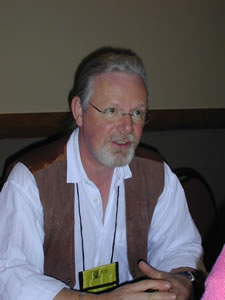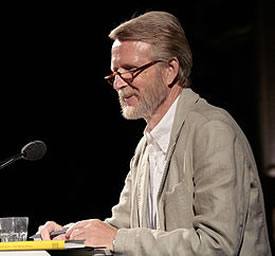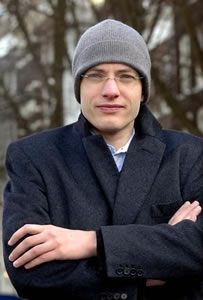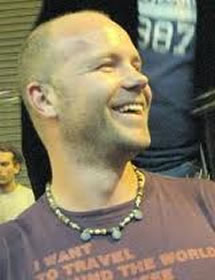De Schotse schrijver Peter May werd geboren op 20 december 1951 in Glasgow. Zie ook mijn blog van 20 december 2009.
Uit: The Killing Room
„Deputy Section Chief Li.” The defense lawyer spoke slowly, as if considering every syllable. “There is no doubt that if one compares these shoe prints with the photographs of the footprints taken at the scene of the murder, one would be led to the conclusion that they were made by the same pair of shoes.” Photographs of the footprints and the corresponding shoe prints were laid out on the table in front of him.
Li Yan nodded cautiously, uncertain where this was leading, aware of the judge watching him closely from the bench opposite, a wily, white-haired veteran languishing thoughtfully in his winter blue uniform beneath the red, blue, and gold crest of the Ministry of Public Security. The scribble of the clerk’s pen was clearly audible in the silence of the packed courtroom.
“Which would further lead one to the conclusion that the owner of these shoes was, at the very least, present at the crime scene—particularly in light of the prosecution’s claim that traces of the victim’s blood were also found on the shoes.” The lawyer looked up from his table and fixed Li with a cold stare. He was a young man, in his early thirties, about the same age as Li, one of a new breed of lawyers feeding off the recent raft of legislation regulating the burgeoning Chinese justice system. He was sleek, well-groomed, prosperous. A dark Armani suit, a crisp white, button-down designer shirt and silk tie. And he was brimming with a self-confidence that made Li uneasy. “Would you agree?”
Li nodded.
“I’m sorry, did you speak?”
“No, I nodded my agreement.” Irritation in Li’s voice.
“Then please speak up, Deputy Section Chief, so that the clerk can note your comments for the record.” The Armani suit’s tone was condescending, providing the court with the erroneous impression that the police officer in the witness stand was a rank novice.“

Peter May (Glasgow, 20 december 1951)
De Oostenrijkse schrijver Gernot Wolfgruber werd op 20 december 1944 in Gmünd. Zie ook mijn blog van 20 december 2008 en ook mijn blog van 20 december 2009.
Uit: Herrenjahre
„Melzer wußte selber nicht, woher er das hatte, er dachte auch nicht darüber nach, es schien ihm viel zu einleuchtend, war ihm etwas wie eine Lebensweisheit: daß es für jeden einen Zug gäbe, jeder seinen Zug habe, und worauf es ankomme, sei nur, rechtzeitig einzusteigen, ihn nicht zu verpassen, dann gehe es schon voran, dann ergäbe sich alles von selbst, weil es liege ohnedies alles am Zug, den man erwischt habe. Wie sein Zug aussehen würde, in den er würde einsteigen müssen, wußte Melzer nicht. Nur manchmal, wenn er aus dem Kino kam, hatte er das Gefühl, es sei ohnedies alles ganz klar.
Als die ersten seiner Freunde und ehemaligen Schulfreunde anfingen, gesetzter zu werden, zu heiraten, Kinder zu haben, auf den damals noch billigen Baugründen am Stadtrand in Richtung E. Häuser zu bauen, war er noch ganz sicher, daß er das alles anders machen, daß es mit ihm ganz anders laufen würde. Er konnte sich nicht vorstellen, daß man alles so leicht aufgeben kann, meinte, im Grunde seien das alles nur Kleinrentner, die eigentlich schon Schluß gemacht hätten. Er hat einen nach dem anderen von denen abgeschrieben, die plötzlich an den Freitagund Samstagabenden zu Hause blieben und nicht mehr ins Espresso Zankl oder in eins der Wirtshäuser kamen und die er
stattdessen an Sonntagen traf, wenn sie mit Frau und Kind ihren Stadtspaziergang machten.
Daß sich sein Lebenslauf, den er vor der Gesellenprüfung
hatte schreiben müssen, nur durch die besonderen Zahlen seiner Daten von den Lebensläufen der Mitschüler in der Berufsschule unterschied, hat für ihn noch lange nicht bedeutet, daß das auch
weiterhin so sein würde. Er war in der Volksschule Durchschnitt gewesen und in der Hauptschule, hatte in keinem einzigen Fach unter den anderen hervorgestochen, seine Versetzung in die nächste Klasse war nie ernstlich gefährdet gewesen; manchmal war er guter Durchschnitt gewesen, manchmal schlechter, aber immer Durchschnitt. Und seine Lehrzeit war auch eine gewöhnliche Lehrzeit gewesen. Eine Zeit, die man abschreibt. Kuschen, Dreckwegräumen, nichts richtig machen. Jasagen. Alles schon wissen müssen. Nichts denken dürfen. Lernen: sich nicht betroffen zu fühlen, Gedanken folgenlos sein zu lassen. Nicht wehleidig sein dürfen, schon ein Mann sein müssen, Rotzbub sein. Ständig denken: nur noch soundso lang. Hoffnungen aufschieben, abschreiben.“

Gernot Wolfgruber (Gmünd, 20 december 1944)
De Zwitserse schrijver en filosoof Alain de Botton werd geboren in Zürich op 20 december 1969. Zie ook mijn blog van 20 december 2006 en ook mijn blog van 20 december 2007 en ook mijn blog van 20 december 2008 en ook mijn blog van 20 december 2009.
Uit: A Week at the Airport
„While punctuality lies at the heart of what we typically understand by a good trip, I have often longed for my plane to be delayed — so that I might be forced to spend a bit more time at the airport. I have rarely shared this aspiration with other people, but in private I have hoped for a hydraulic leak from the undercarriage or a tempest off the Bay of Biscay, a bank of fog in Malpensa or a wildcat strike in the control tower in Málaga (famed in the industry as much for its hot-headed labour relations as for its even-handed command of much of western Mediterranean airspace). on occasion, I have even wished for a delay so severe that I would be offered a meal voucher or, more dramatically, a night at an airline’s expense in a giant concrete kleenex box with unopenable windows, corridors decorated with nostalgic images of propeller planes and foam pillows infused with the distant smells of kerosene.
In the summer of 2009, I received a call from a man who worked for a company that owned airports. It held the keys to Southampton, Aberdeen, Heathrow and Naples, and oversaw the retail operations at Boston Logan and Pittsburgh international. The corporation additionally controlled large pieces of the industrial infrastructure upon which European civilisation relies (yet which we as individuals seldom trouble ourselves about as we use the bathroom in Bia_ystok or drive our rental car to Cádiz): the waste company Cespa, the Polish construction group Budimex and the Spanish toll-road concern Autopista.“

Alain de Botton (Zürich, 20 december 1969)
De Amerikaanse schrijfster Sandra Cisneros werd geboren op 20 december 1954 in Chicago. Zie ook mijn blog van 20 december 2008 en ook mijn blog van 20 december 2009.
Uit: The House on Mango Street
„Marin’s boyfriend is in Puerto Rico. She shows us his letters and makes us promise not to tell anybody they’re getting married when she goes back to P.R. She says he didn’t get a job yet, but she’s saving the money she gets from selling Avon and taking care of her cousins.
Marin says that if she stays here next year, she’s going to get a real job downtown because that’s where the best jobs are, since you always get to look beautiful and get to wear nice clothes and can meet someone in the subway who might marry you and take you to live in a big house far away.
But next year Louie’s parents are going to send her back to her mother with a letter saying she’s too much trouble, and that is too bad because I like Marin. She is older and knows lots of things. She is the one who told us how Davey the Baby’s sister got pregnant and what cream is best for taking off moustache hair and if you count the white flecks on your fingernails you can know how many boys are thinking of you and lots of other things I can’t remember now.
We never see Marin until her aunt comes home from work, and even then she can only stay out in front. She is there every night with the radio. When the light in her aunt’s room goes out, Marin lights a cigarette and it doesn’t matter if it’s cold out or if the radio doesn’t work or if we’ve got nothing to say to each other. What matters, Marin says, is for the boys to see us and for us to see them. And since Marin’s skirts are shorter and since her eyes are pretty, and since Marin is already older than us in many ways, the boys who do pass by say stupid things like I am in love with those two green apples you call eyes, give them to me why don’t you. And Marin just looks at them without even blinking and is not afraid.
Marin, under the streetlight, dancing by herself, is singing the same song somewhere. I know. Is waiting for a car to stop, a star to fall, someone to change her life.—“

Sandra Cisneros (Chicago, 20 december 1954)
De Nederlandse schrijver Ramon Stoppelenburg werd geboren in Leiden op 20 december 1976. Zie ook mijn blog van 20 december 2008 en ook mijn blog van 20 december 2009.
Uit Let me stay for a day
„About getting from one place in Dublin to another and staying with the Spanish Lluis.
I woke up and saw a clock make his round. It was nearly 1pm before I got out. Jim had to turn on the boiler for the shower, so we first had a ‘brunch’ with bacon and eggs.
When I got fully dressed Jim and I got settled for the story he wanted to write about me for the Evening Herald. So we sat down in his living with coffee and cigarettes and while Jim had his little recorder on, I answered all his questions.
I expect the article to be published coming Tuesday and the newspaper will be available everywhere in Ireland as it is the only evening paper.
I am really probing for the impact of the story, because I could use more places-to-stay in Ireland.
Around 4.45pm we left the house in this quarter called Oxmantown. I was fully packed again and after I would leave Jim for my next host, he decided to go for a drink with some friends of him in a pub in the city centre.
It was okay for me, especially as Jim told me it was only a twenty minutes walk.
But I already learned that: when English or now even Irish people say that some location is only so many minutes away, double it. No, triple it! I don’t know how they do it themselves, because I never rush it within the doubled time.“

Ramon Stoppelenburg (Leiden, 20 december 1976)
